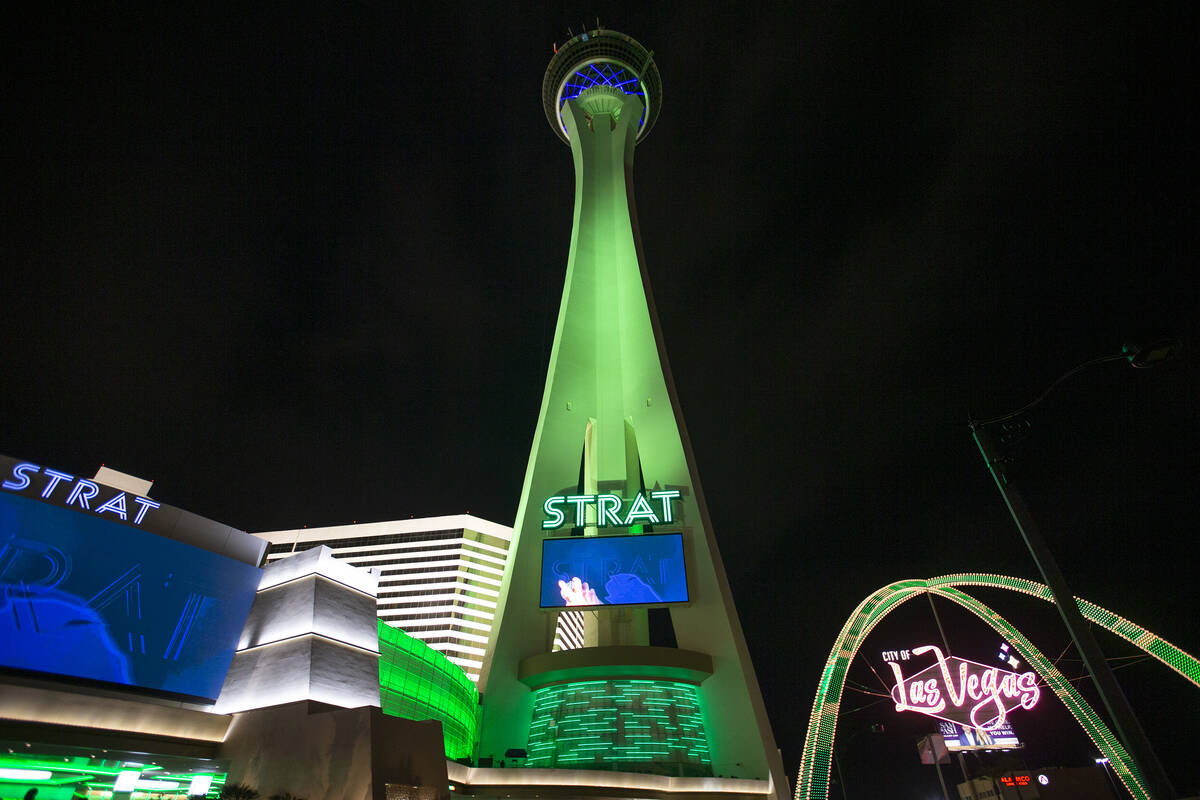Executives at the Las Vegas-based Golden Entertainment told investors Thursday the gaming company was “active” in looking for strategic alternatives, including a sale-leaseback at the Strat.

Frustrated with its low stock valuations, executives at the Las Vegas-based Golden Entertainment told investors Thursday the gaming company was “active” in looking for strategic alternatives, including a sale-leaseback at its Strip-area property or even seeking out a corporate merger.
During the company’s third-quarter earnings call with Wall Street investors, Truist Securities analyst Barry Jonas asked executives about Golden’s appetite for mergers and acquisitions, including selling their real estate but keeping a property’s operations, similar to other transactions on the Strip.
Executives said there they were considering multiple avenues to improve the valuation of the company, given its real estate portfolio that includes the Strat hotel-casino north of the Strip.
“I don’t think it’s overstating that we are in ‘active’ mode now, looking at all of our potential strategic alternatives,” CEO Blake Sartini said. “In regards to (real estate investment trusts) particularly… we’re looking for (holding company) assets. I don’t think there are many of those out there. There’s limited inventory. That would be our preference in terms of moving the needle for valuation.”
Typical sale-leasebacks of hotel-casinos result in the seller gaining a massive cash infusion, sometimes spent on new projects or otherwise supporting a business’ balance sheet. It often signs the operators onto a high-priced lease that must be paid every year to the new landlord.
In February 2022, for instance, VICI Properties purchased the land and real estate assets of The Venetian for $4 billion from Las Vegas Sands Corp. while Apollo Global Management bought the operations for $2.25 billion. The initial annual rent was announced at $250 million.
Major REITs on the Strip include Vici Properties, Blackstone Group and Gaming and Leisure Properties Inc.
Golden’s Chief Financial Officer Charles Protell said they didn’t want to use the potential capital infusion for future development. Instead, Sartini said that activity — or other transactions — could improve the company’s valuation.
“It’s frustrating to see we get no credit for the real estate whatsoever. So within that context, we’re frustrated with the valuation, and we are sitting in a good position with a strong balance sheet, wholly owned real estate and a well-run company to look at all alternatives,” Sartini said. “So yes, corporate merger, we’re active in looking at all things that may potentially drive significant value to our current portfolio.”
Executives also touted undeveloped real estate and other spaces in their portfolio as opportunities to drive more visitor traffic to the Strat. They said five and a half acres of developable land – currently a parking lot across from the casino, at the dead end of Bob Stupak Avenue and Las Vegas Boulevard – and 150,000 square feet of free space on the mezzanine level are both in play for potential development.
Third-quarter results
For the quarter that ended Sept. 30, the Nasdaq-traded company reported net income of $5.2 million on $161.2 million of revenue. That’s compared to $241.2 million of net income on revenue of $257.7 million for the same quarter last year. Officials said the decrease was primarily because 2023’s results included revenue from the now-divested Rocky Gap Casino in Maryland.
Continuing operations still saw a total revenue decline of 5 percent.
“Las Vegas experienced record heat this summer, which contributed to lower visitation at our casino properties and local taverns,” Protell told investors. “In addition, we saw continued weakness at the lower tiers of our database as those consumers have reduced their discretionary spending in the current economic environment. Despite these challenges, we see Q3 as the lowest level of financial performance for our portfolio given October trends and our outlook for the remainder of the year.”
The Review-Journal is owned by the Adelson family, including Dr. Miriam Adelson, majority shareholder of Las Vegas Sands Corp., and Las Vegas Sands President and COO Patrick Dumont.

